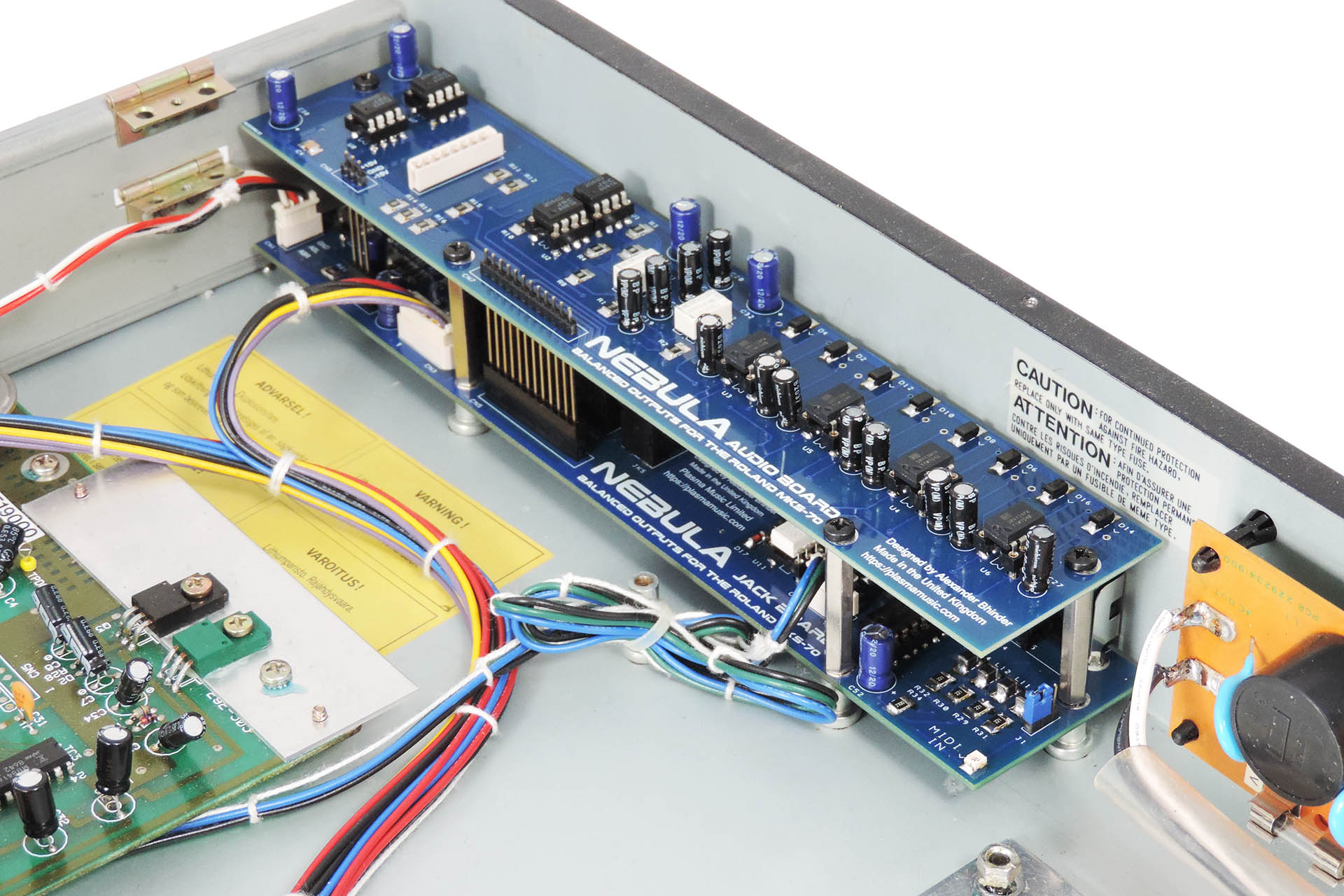Today I received an e-mail with a rather interesting question; a MKS-70 owner, uses upper and lower voices as two separate instruments and suffers from crosstalk. He asked me if would Nebula reduce crosstalk. Such a good question.
Cross talk can be considered as a type of interference. Unlike noise high up in the electromagnetic spectrum such radio frequencies (RF) however, crosstalk specifically pertains to audio.
Fundamentally, crosstalk is a 'leakage' of signal between two (or more) audio channels and occurs when a signal flowing in one audio circuit is induced into the signal flowing in another audio circuit. This can occur for one of several reasons such as:
- Signal sources are high impedance.
- Signal destinations are low impedance.
- Earth isn't absolute and actually carries a small voltage offset or even some audio.
Normally associated with the channels that make up a stereo configuration (left and right), in the MKS-70, we should also consider potential crosstalk between the outputs of each module-board (as per the question at the beginning of this post).
So let's have a look at some aspects of the MKS-70 which might produce crosstalk...
Firstly, the audio outputs of each module-board come straight out of a pair of M5218L op-amps and as we all know, op-amps have a very low output-impedance. Hence, the module-board outputs shouldn't contribute significantly to crosstalk. We can therefore cross reason 1 off our list.
Interestingly, there are no low-value resistors on the outputs of those M5218Ls, which you might normally expect. That's because Roland used series resistors later on in the chain (on the jack-board), to provide passive mixing for the headphone amp.
Coming off each MKS-70 module-board, there are four wires; left audio / left earth and right audio / right earth. There’s nothing connecting the two module-board audio paths at this point.
The two sets of connections (eight wires all together) go straight to the jack-board. Here, Roland implemented an ingenious passive switching / mixing system which automatically directs appropriate signals depending on which jack sockets are accessed.
On the original jack-board, the four audio signals are also combined passively, to provide a stereo headphone output and a mono output.
This passive mixing network would potentially present the outputs from the module-boards with a relatively low input impedance but... there's more to it than that; the headphone op-amp is in non-inverting mode and so each input is strapped to ground via a resistor. The resistor has a value of 100kΩ so in parallel with the very high input-impedance of the 5218P (about 5MΩ) the input-impedance of each channel is roughly the same; 100kΩ, which is pretty good. The value of this resistor is critical and requires a bit of a balancing act by the designer. Yes, you want it to be high but if it's too high, then noise will be introduced into the system and we definitely don't want that.
So with a high input-impedance, we can also cross reason 2 off our list.:)
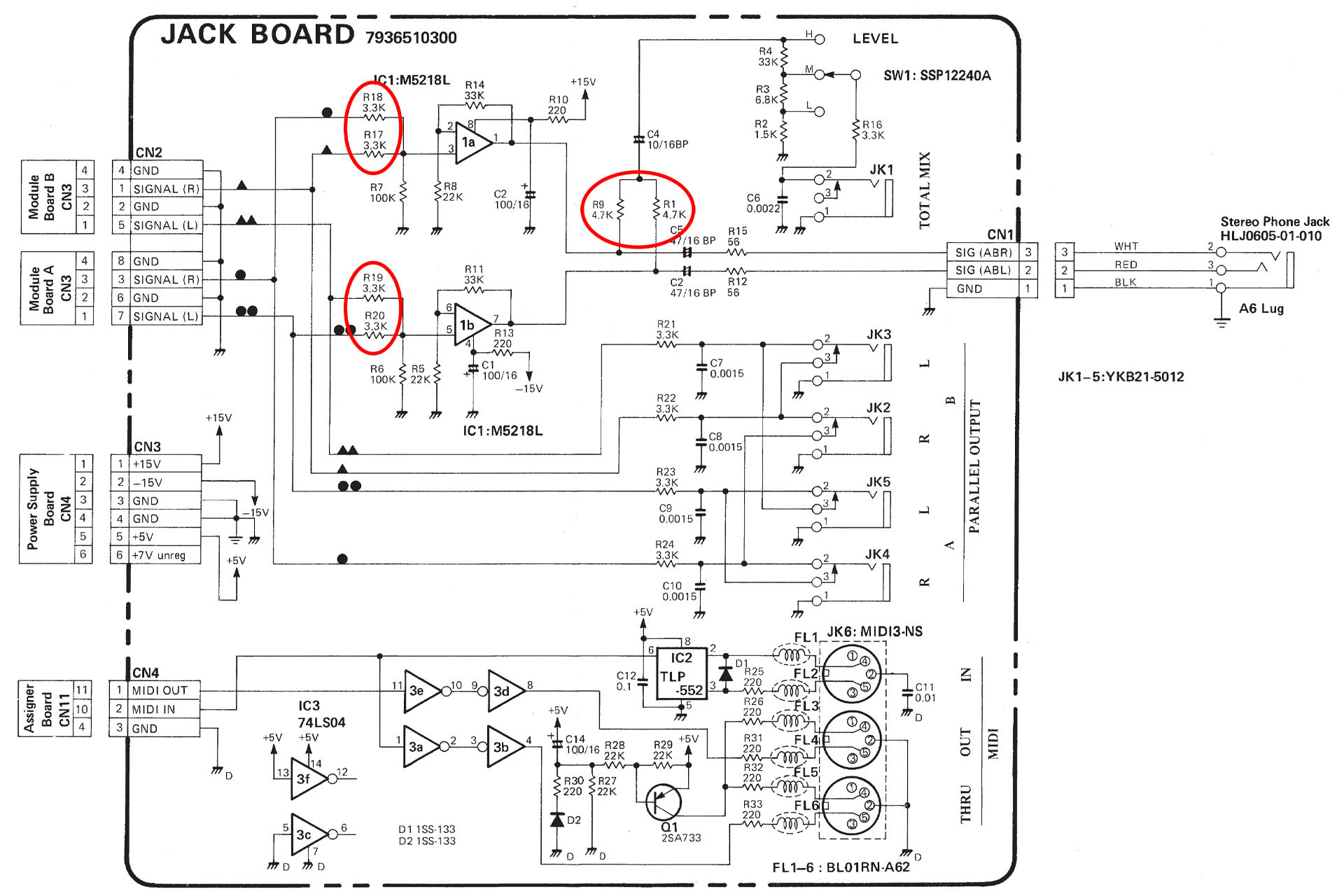
SO WHY ARE THERE TWO EARTH WIRES COMING OFF THE NODULE-BOARD TO THE JACK-BOARD?
Consider a single audio connection between a module-board and the jack-board, as a kind of potential divider. The signal carrying conductor is one resistor, the input impedance of the jack-board is another resistor and the return path (earth) is a third resistor. Did you notice what I just did? We're treating the earth here as a conductor. Okay, so the voltage drop across each wire will be directly proportional to the input impedance of the jack-board, right? Hence, if the input-impedance of the jack-board is low, then the voltage drop across the wire carrying audio and the earth wire (return) will be proportionally higher than if the input-impedance of the jack-board was high.
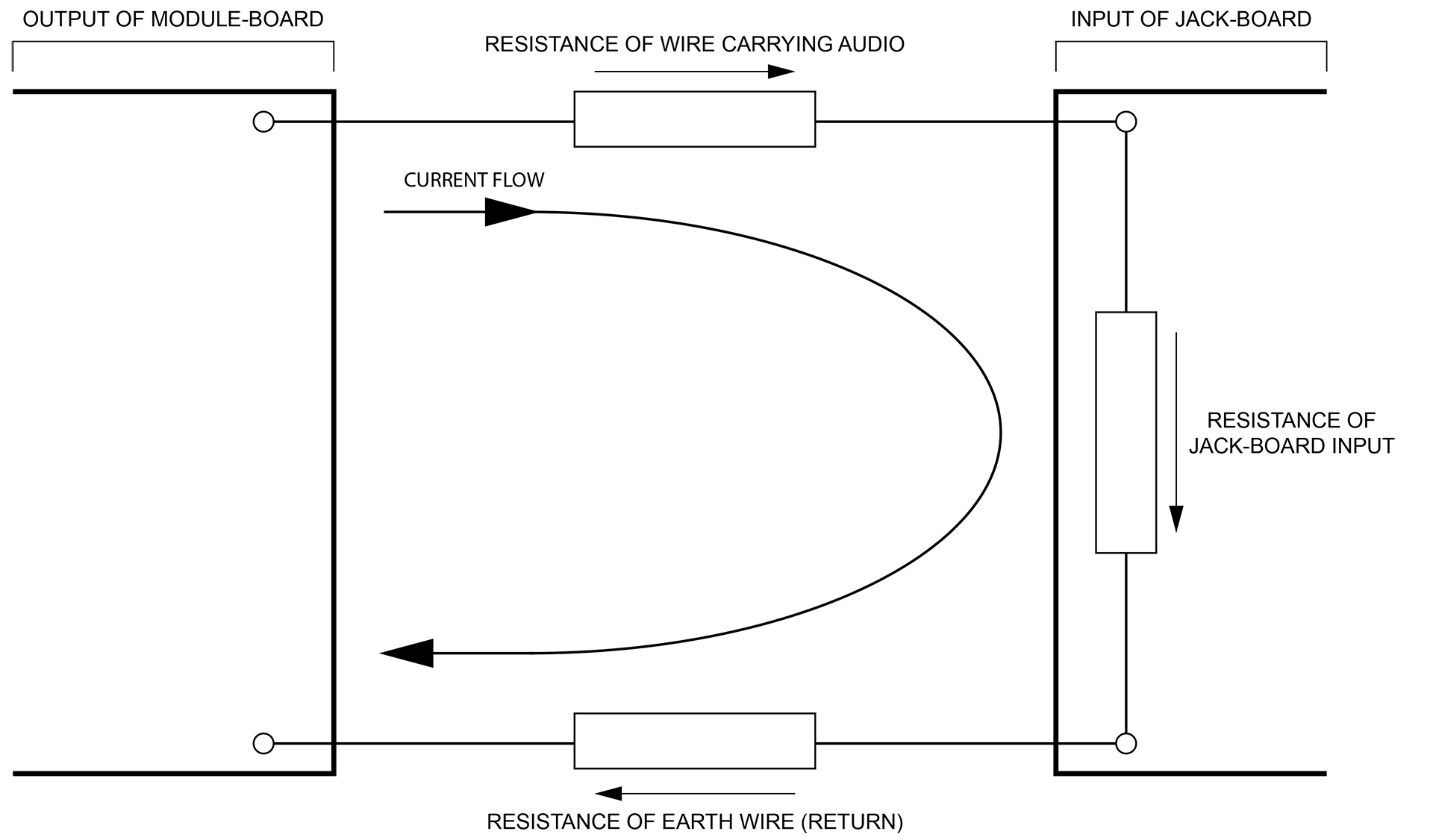
Now then, if the earth (return) path is shared between left and right outputs for example, crosstalk between those channels could (might) occur. Having separate earth connections (return paths) for each audio path, reduces the potential for that. That's why each audio channel in the Super-JX, has its own earth connection between the module-board and the jack-board.
In my humble opinion however, the potential for crosstalk as a result of using one earth connection between the module-board output and the jack-board input in the MKS-70, is minimal. The physical distance between the two points is only 25cm or so. The output-impedance of the module-board is low and the input-impedance of the original jack-board and indeed Nebula, is high.
With identical sound engines, digital control and similar operational functionality, the very obvious difference of internal layout, makes the JX-10 a very different animal. The physical distance between the module-board outputs and the jack-board inputs in the JX-10, is quite different than in the MKS-70. Running substantial distances, the cables that carry audio in the JX-10 are also strapped together with data and power carrying wires, giving the JX-10 much higher noise and crosstalk levels than its rack-mounted cousin. It's of no surprise then, that the audio cables in the JX-10 are, err... screened! Indeed audio destined for the outputs, has a tough time in the JX-10.
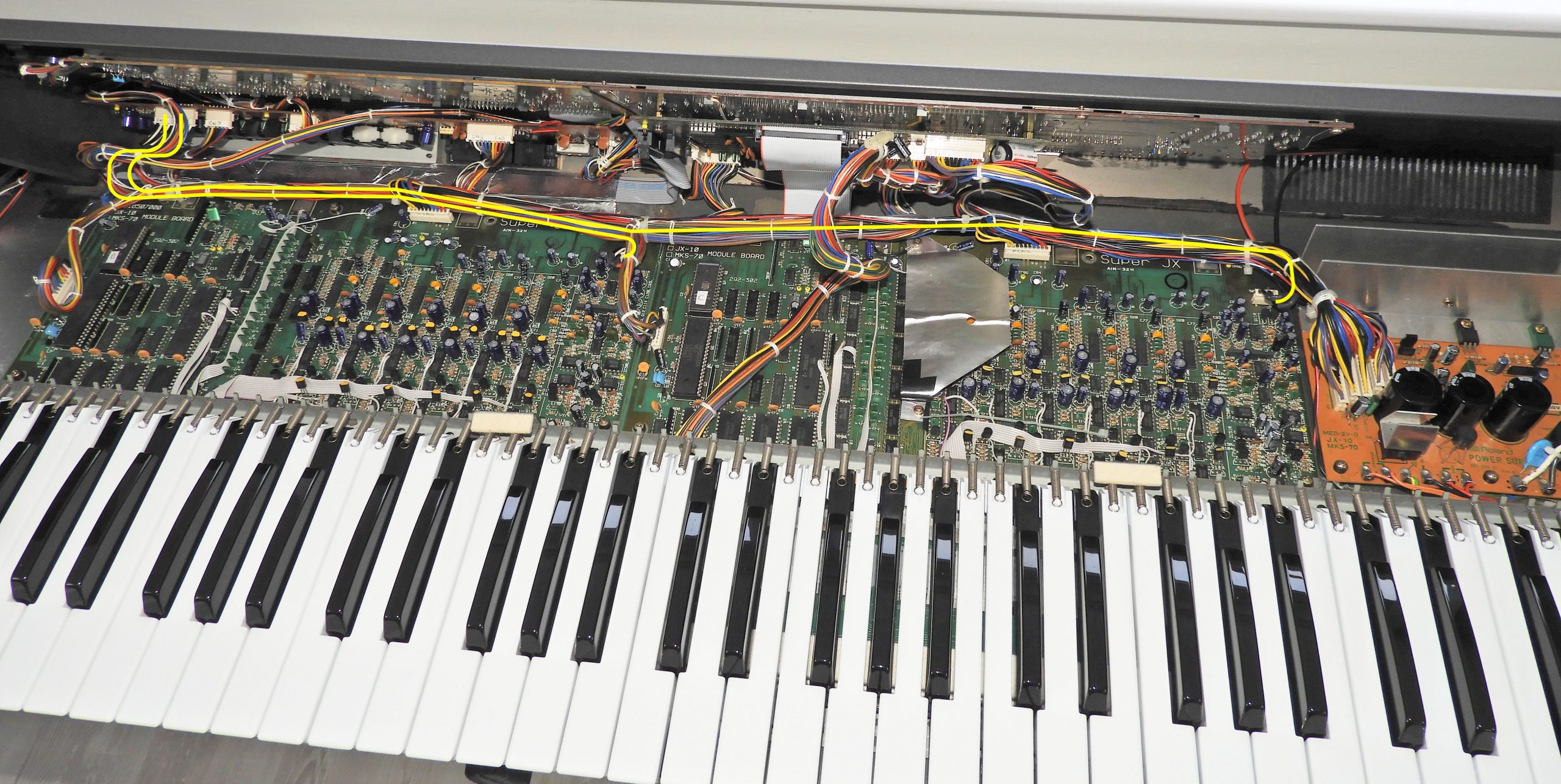
For balanced operation, the jack sockets on Nebula are of course, 3-pole and not 2-pole as per the original jack-board. I wasn't able to find 3-pole sockets with switching, that fitted next to each other and hence, lined up with the holes in the rear of the MKS-70. Neither could I therefore, emulate Roland’s rather ingenious automatic output selection system. Using active components and taking advantage of the original level-selector switch cut-out in the rear of the MKS-70 chassis, the outputs of Nebula are switched manually from stereo to individual operation.
On a side note, manual selection of Nebula's output configuration has another slight benefit; all four outputs from Nebula can permanently be left connected to a mixing desk. With the original jack-board, if you did that, your MKS-70 would only be able to output four independent channels and would be unable to go stereo.
Instead of tapping and mixing the signals for the headphone output mix from the individual signals from each module-board via resistors (R17 - R20 in the diagram above), Nebula uses op-amps. It would have been quite tempting to design Nebula with very high input-impedance but I didn't want to introduce more noise and keeping things in perspective, the original 100kΩ was / is just fine.
I should mention that similar to the original Roland jack-board, Nebula's mono mix signal, is derived via passive mixing of left and right signals but only after Nebula's headphone amp. The headphone mix is tapped off the individual signals via active buffers. The inputs of these buffers are in parallel with Nebula's channel input buffers so the input-impedance of each channel remains at about 100kΩ. This arrangement significantly reduces the potential crosstalk.
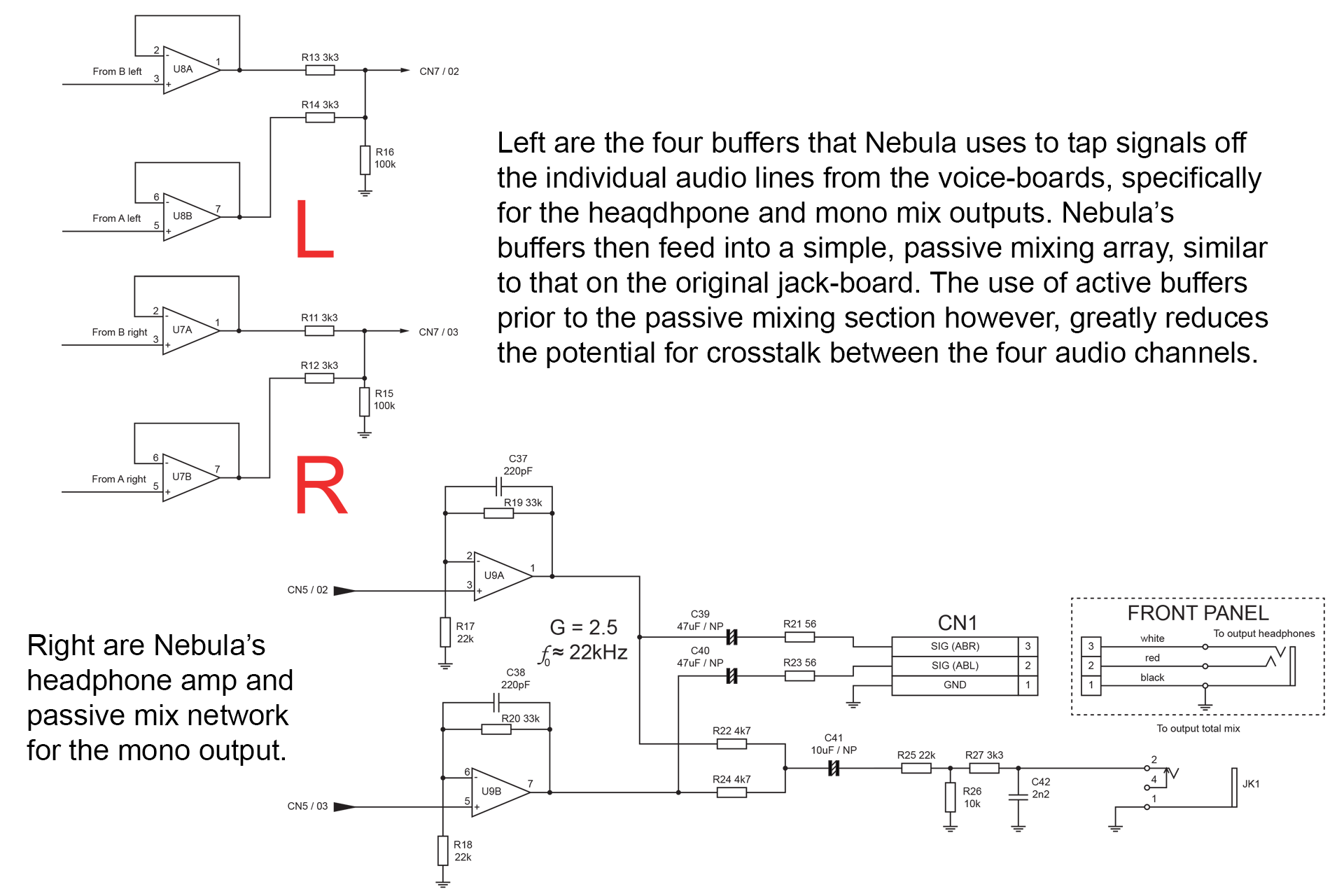
Before we consider earth integrity as a potential source of crosstalk, let's take a quick look at the potential for inter-board crosstalk (which after all, was the question at the beginning of this post).
The output-impedance of each module-board is of course, identical so again, we're not going to consider that to be an issue.
The earths (audio signal return paths) on each board are completely separate to each other so that's not going to be an issue, either, although if shared, I'm not convinced it'll make any difference.
The input-impedance of each channel on the original jack-board and Nebula is about 100kΩ so that's fine and not really an issue.
Another design feature of Nebula which reduces inter-board crosstalk considerably, is that left and right channels are processed through the same dual op-amp. The left and right outputs from one module-board are processed though one dual op-amp.
It's interesting to note that the audio connections from the module-boards on the MKS-70 terminate at the jack-board end, with a single 8-way Molex connector. Each module-board audio connection on the JX-10 however, has its own 4-way Molex connector on the JX-10 jack-board. It seems that Roland engineers were aware of potential issues on the JX-10 and went to some trouble in an attempt to address them.
So finally, we need to look at the earth on our Super-JXs.
As we know, many Roland instruments were made available with IEC 2-pin C9 power input sockets which means that they weren't directly connected to mains earth. Hmm.... So perhaps the reason we have crosstalk problems in the first place, is because some Super-JXs don't have a good earth.
Taking a few steps back and thinking about the JX-10 again, solid earth or not, the JX-10 is just not as heavily screened as the 100% steel enclosure of the MKS-70. That means that although Roland tried its best, by the nature of the beast, external EMF could mess things up for the keyboard version of the Super-JX.
Incidentally, if you're concerned about the earth status of your Super-JX, then don't be. You could always buy my IEC C14 earth bonding kit! 🙂
Each of Nebula's four main outputs, are driven by separate balanced line drivers. These devices are single-channel and other than power and earth, there's no other (common) connections between them. Hence, there won’t be any crosstalk introduced at that stage.
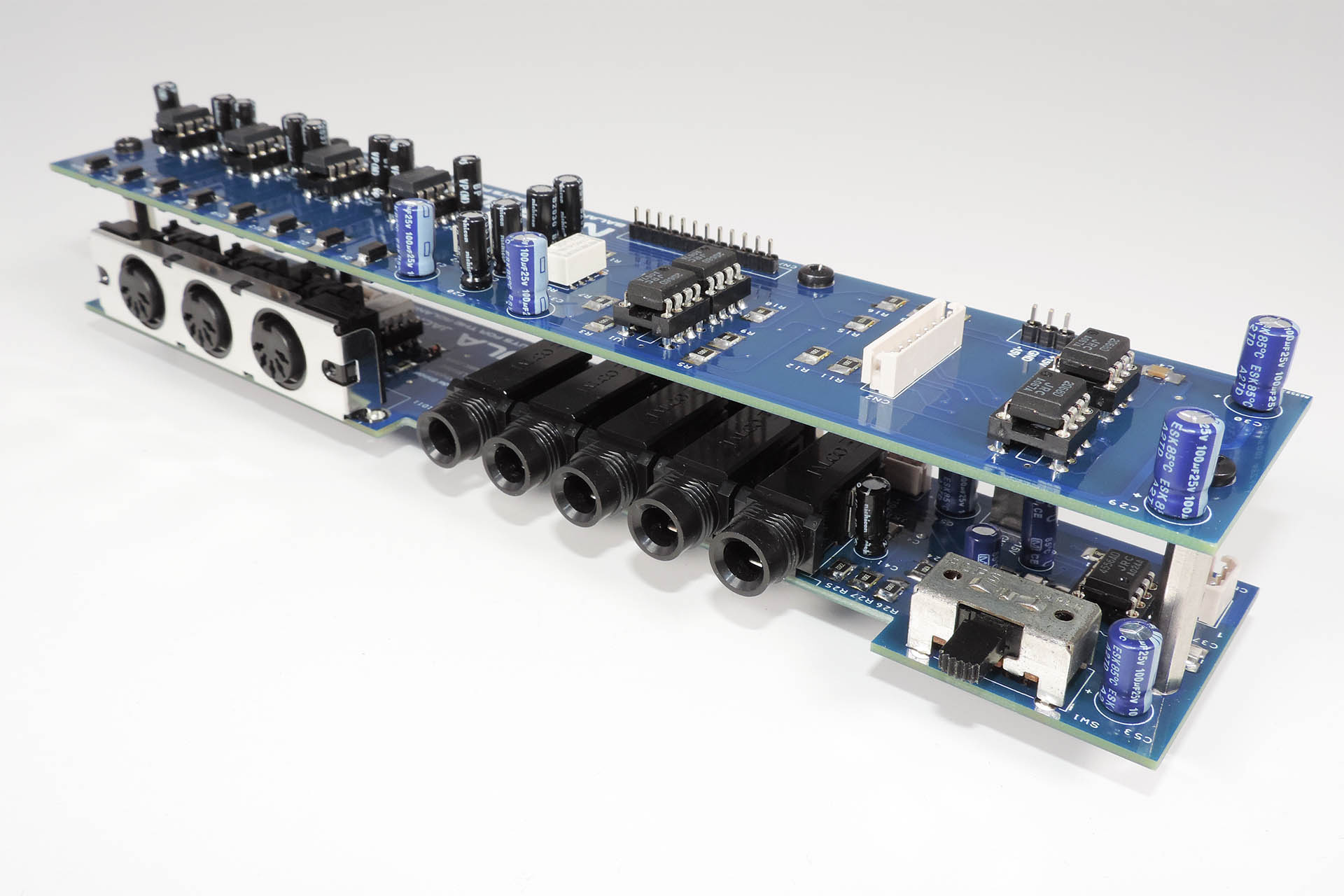
One final, perhaps slightly controversial point to consider, is "how stereo is the stereo output from a Super-JX module-board?" That's another really good question. It's only the chorus effect that makes the left and right audio channels, different. WOW!!!!
So to answer the original question; "would Nebula reduce crosstalk when using upper and lower voices on the MKS-70 as two separate instruments?" YES, most definitely.
Nebula doesn't introduce any potential for crosstalk but with no passive channel switching / mixing, it definitely has better crosstalk performance than the original jack-board.
Service notes for the Roland MKS-70 can be obtained here: https://www.synthxl.com/mks-70/ (PLEASE don't forget to leave a donation).


